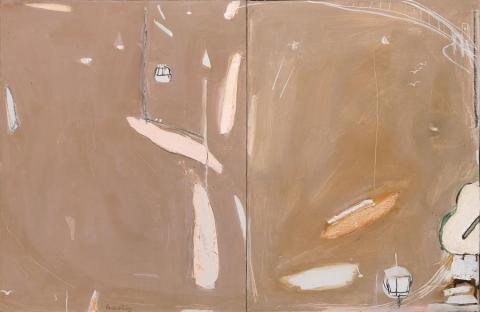SYDNEY WINTER, 1980
BRETT WHITELEY
oil and mixed media on canvas
51.0 x 78.5 cm (diptych)
signed lower left: Whiteley
signed, dated and inscribed verso: ‘SYDNEY WINTER’ / brett whiteley 80
Robin Gibson Gallery, Sydney
Private collection, Sydney
Brett Whiteley returned to Sydney in November 1969 with his wife Wendy and their little girl Arkie after almost ten years in London, Europe, America and Asia. They settled in a white three story house in Walker Street, Lavender Bay overlooking the harbour through the fig trees and frangipani.1 The views from the windows of the sitting room were picturesque and uninterrupted reaching out to the arch of the Harbour Bridge and its rusticated pylons. In 1974 the Whiteleys purchased the Lavender Bay house and the artist began one of his most adored and diverse series of works - the Lavender Bay Series. It was a subject he would return to often in numerous media, evoking the many dramatic weather changes experienced on the harbour, from azure blue days, starry nights and grey days thick with rain. Sydney Winter of 1980 is one of the rain meditations, the palette of which is born of those smoky abstract works painted in London during the early 1960s.2 Whiteley was fascinated with the effects of rain and wind on the harbour and he painted a number of works depicting rainy Sydney days including Lavender Bay in the Rain, 1974 (private collection) and the well known1987 lithograph of the same title, which depicts the jetty below the house through the palm trees with the same characteristic palette of soft grey and white. In Sydney Winter, the Harbour Bridge is seen through a veil of rain and appears like an apparition in the top right corner of the work. Here the yachts and watercraft are left moored in the rain awaiting fair-weather days and a few solitary seagulls retreat into the distance towards the Bridge.
1. McGrath, S., Brett Whiteley, Bay Books, Sydney, 1992, p. 99
2. A critical example of these works is Untitled Red Painting, 1960, Tate Gallery, London, which started its life as a 'white' painting and then evolved into a rosy taupe palette, highlighted with creams.
LARA NICHOLLS
